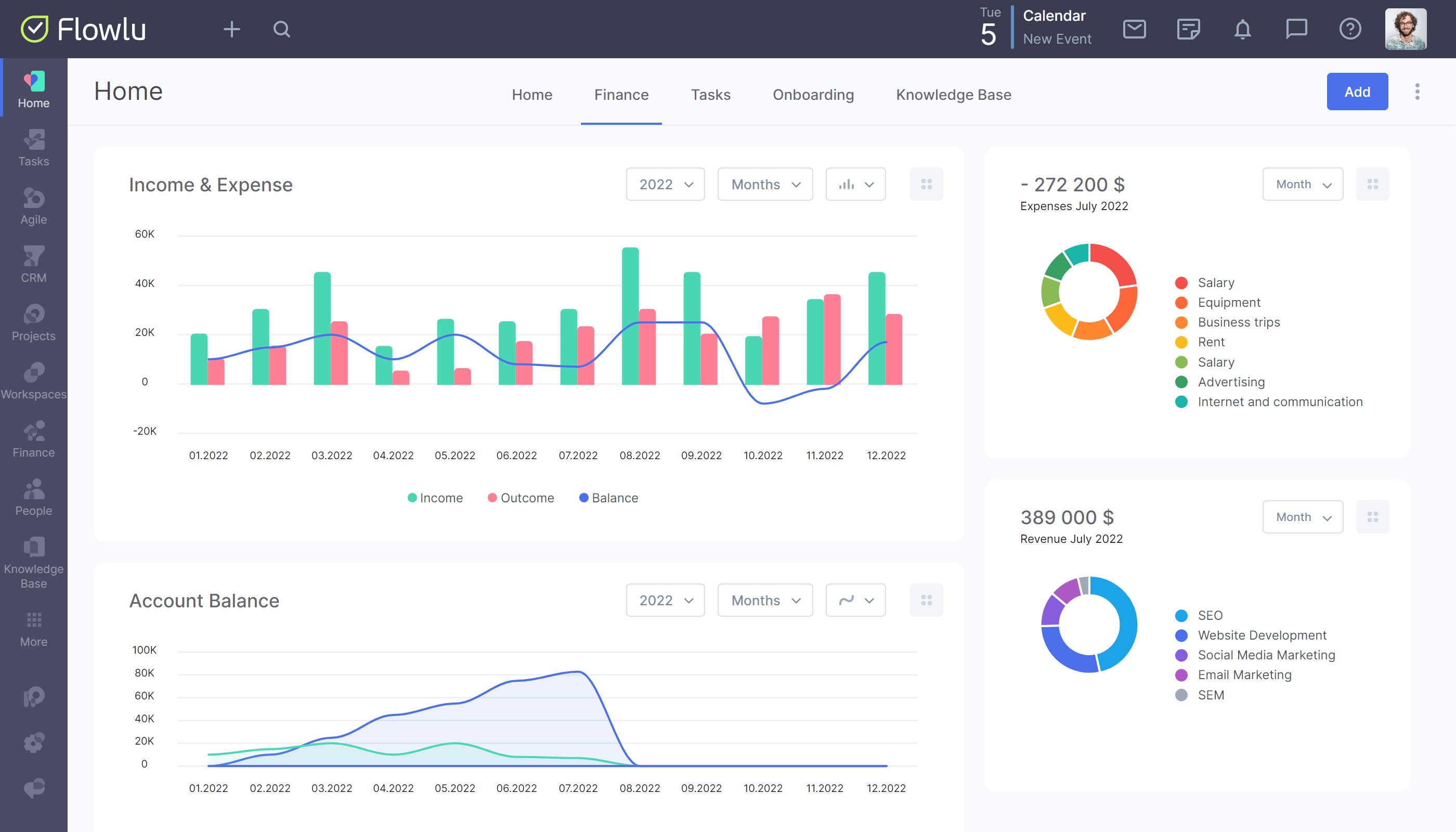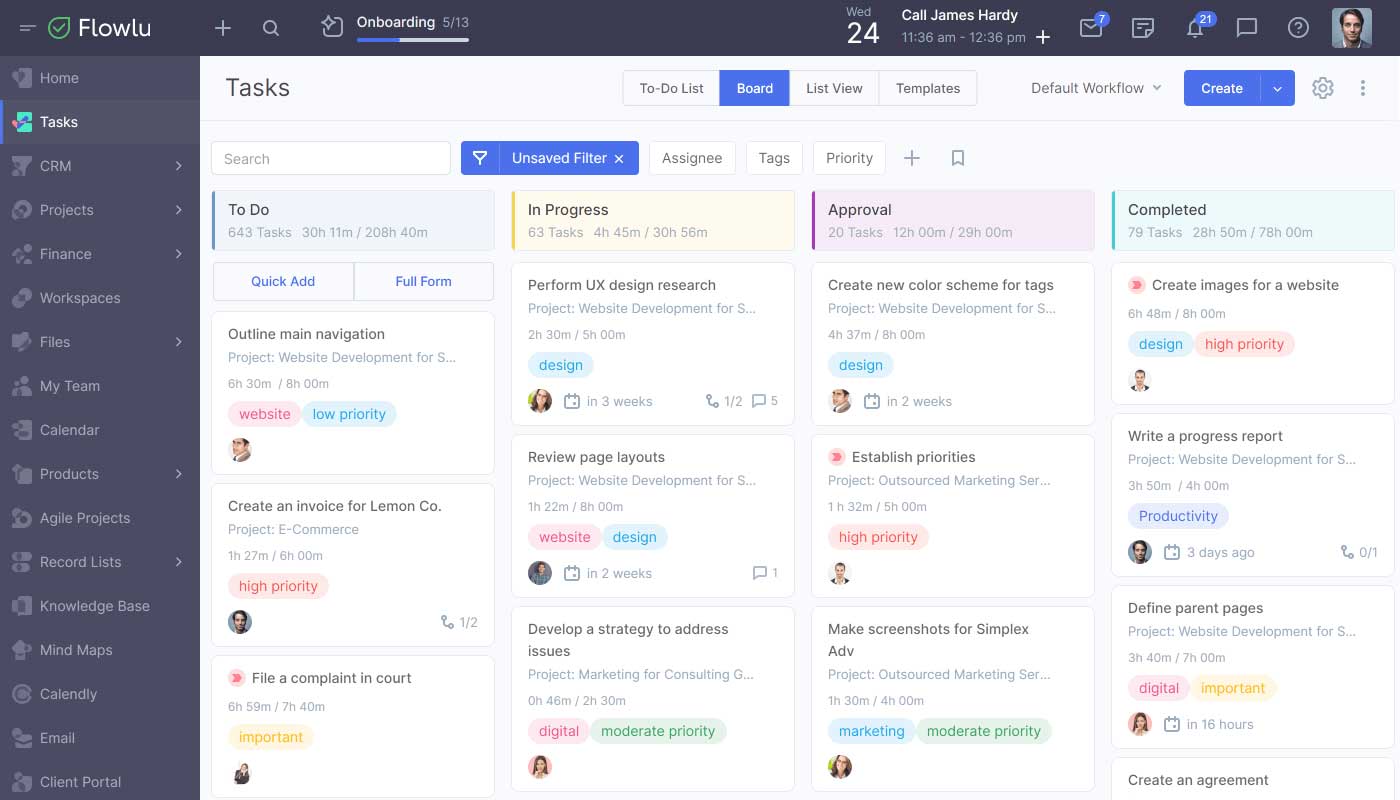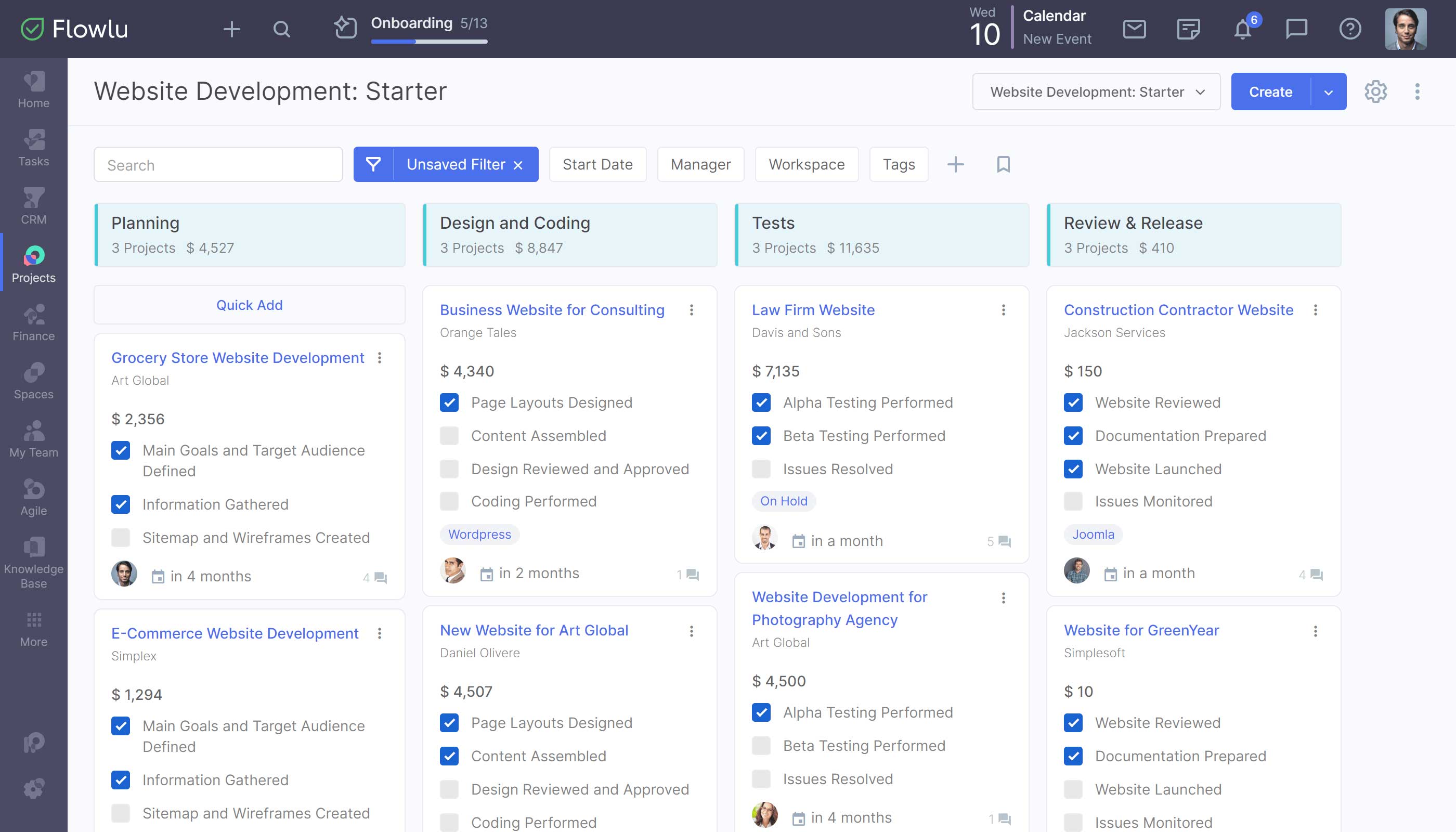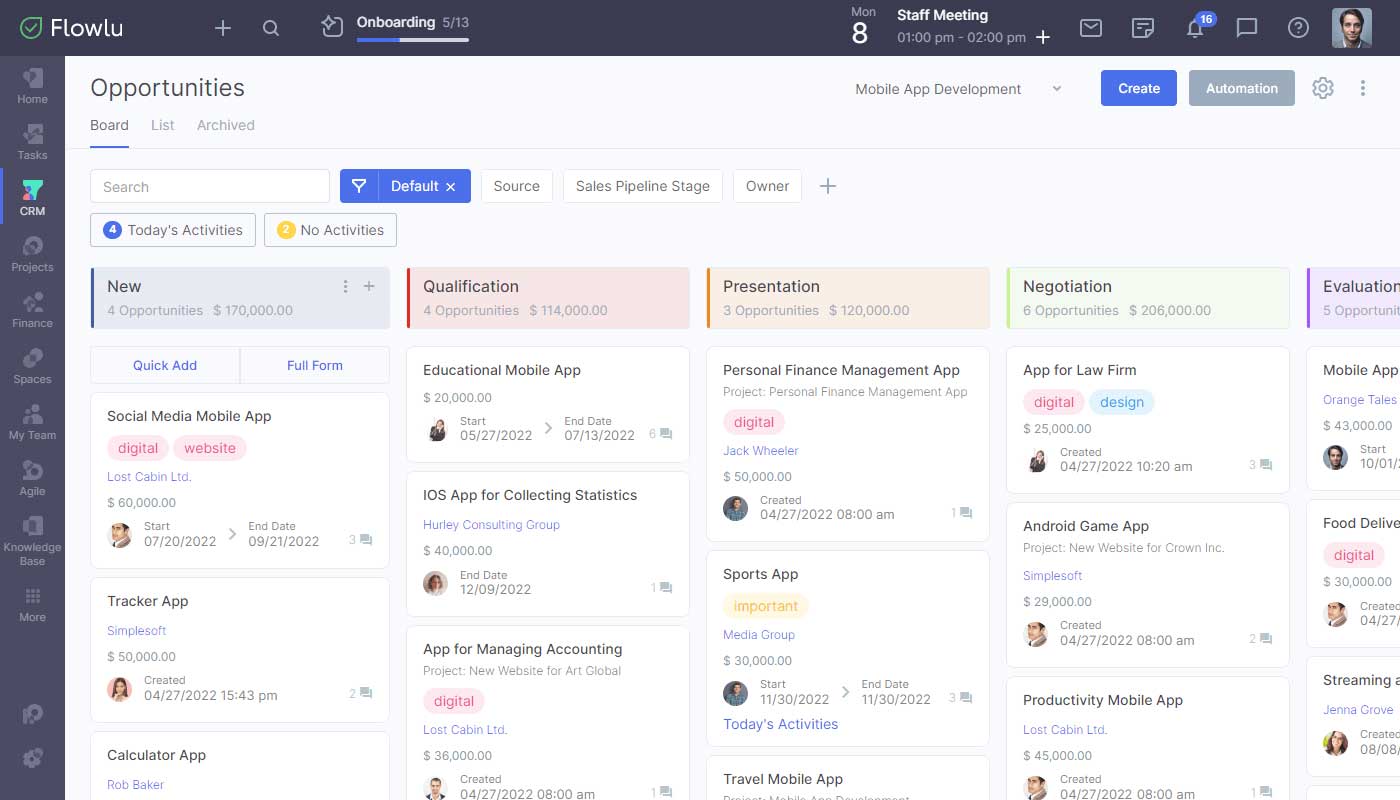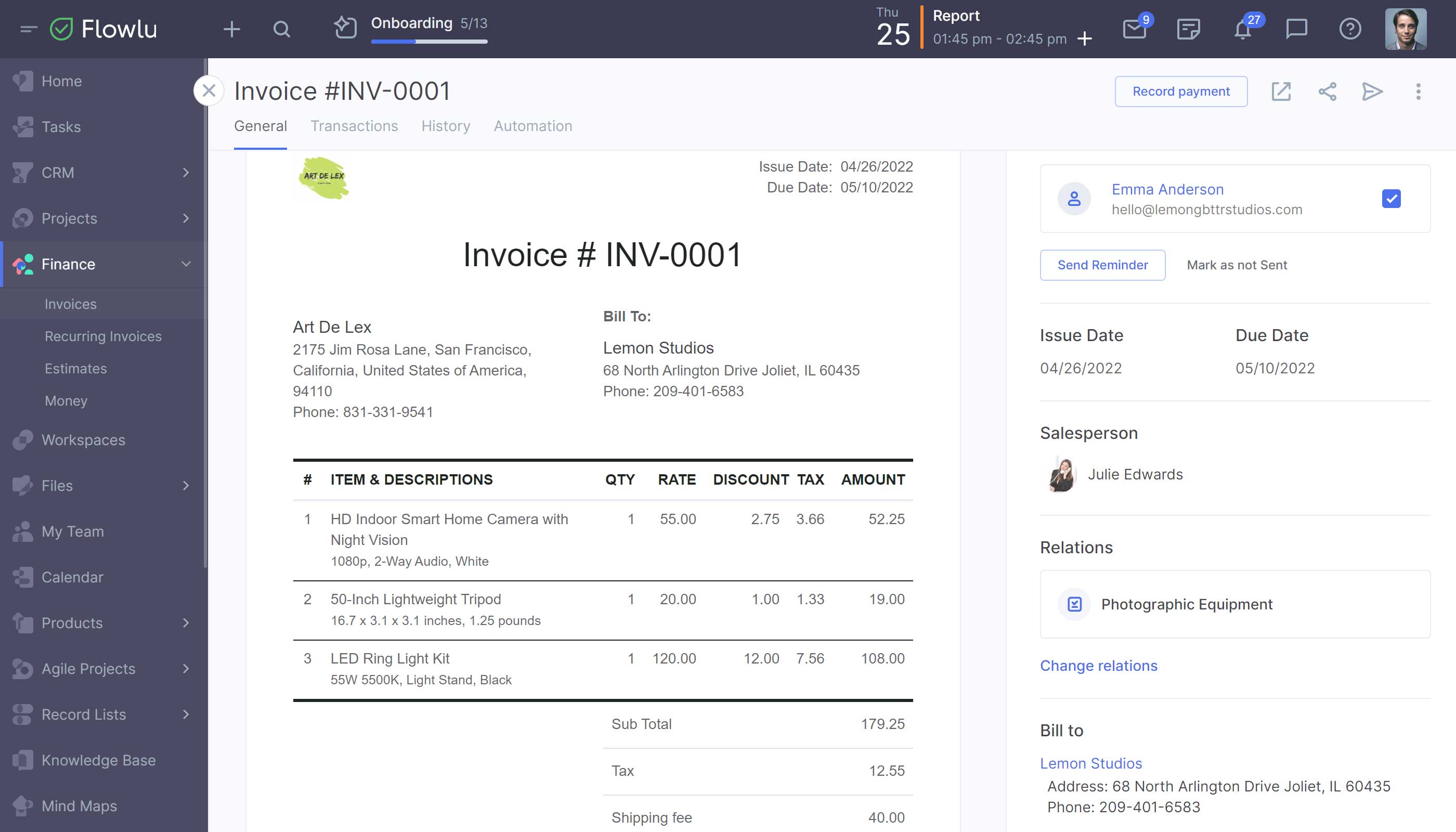
Flowlu Review: Pros & Cons
Flowlu stands out in the crowded market of platforms catering to SMBs by offering a suite of features that are usually reserved for high-end enterprise solutions.
Pros & Cons of Flowlu
Pros
A diverse set of features for managing a business
More affordable than similar competitors
User-friendly interface
Responsive support team
Easy-to-use chat features, including on the mobile app
Cons
CRM is good but not mind-blowing
Missing some essential features
Could use more customization options
Needs more integrations to storage services like Dropbox
Task management features could be better
Flowlu's Standout Features
Flowlu stands out in the crowded market of platforms catering to small and medium-sized businesses (SMBs) by offering a suite of features that are usually reserved for high-end enterprise solutions. What sets Flowlu apart is its ability to provide SMBs with access to advanced functionalities, such as a sophisticated Customer Relationship Management (CRM) system and comprehensive project management tools, without the hefty price tag associated with larger enterprise software. This unique positioning enables smaller businesses to leverage powerful capabilities to streamline their operations, enhance customer interactions, and manage projects more effectively, all while maintaining affordability.
From user reviews, it's clear that one of the key benefits of Flowlu is the way it centralizes business data and activities. This centralization helps reduce the barriers between different parts of a business, leading to improved efficiency. Users often note how this setup enhances communication and collaboration within their teams, making it easier to make informed decisions and maintain a cohesive approach to their work.
Ease of use is another aspect frequently highlighted in reviews. Users point out that Flowlu is designed to be accessible, even for those who might not be very tech-savvy. This user-friendliness, combined with positive feedback about the support team, suggests that getting help and navigating the platform is generally straightforward, contrasting with some other tools that might come across as overly complex or lacking in support.
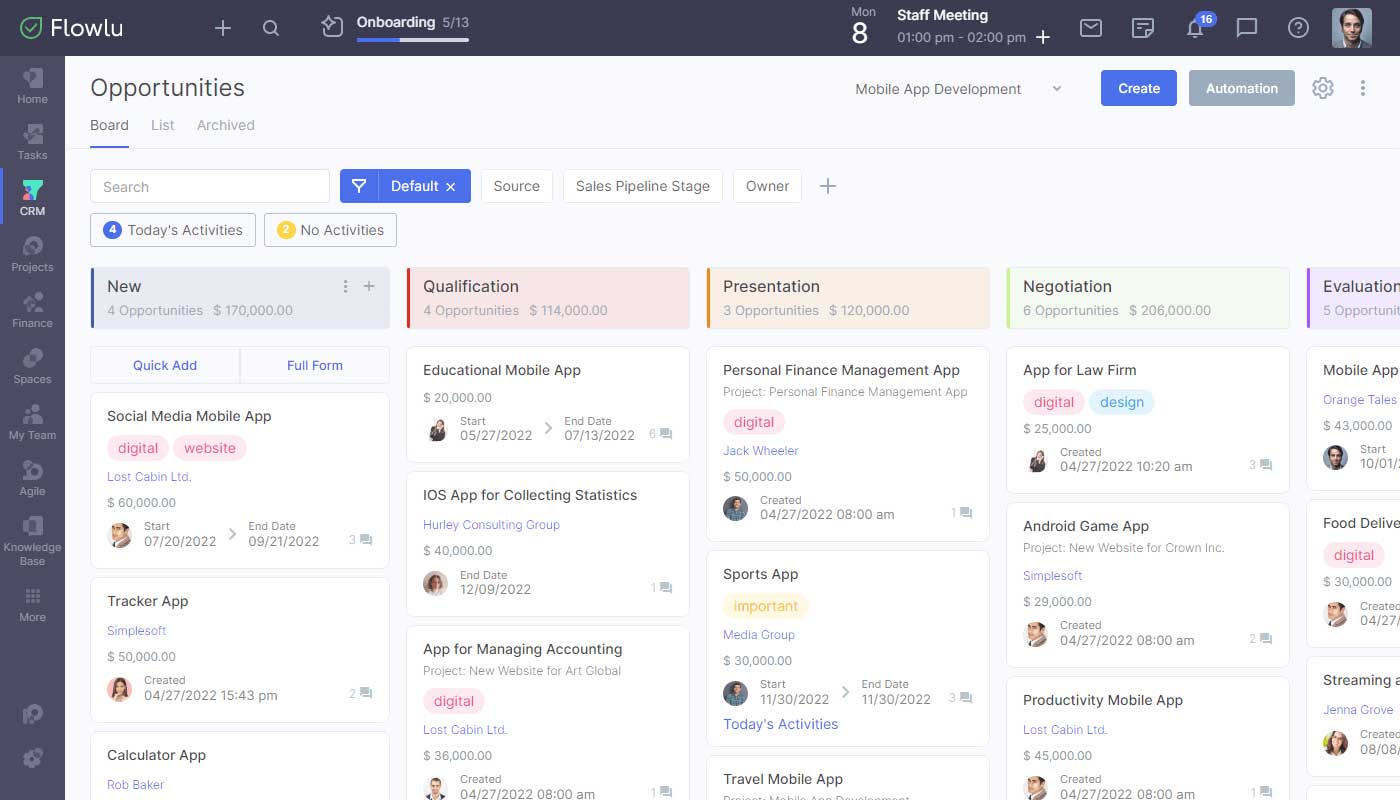
Who Benefits Most from Flowlu?
Flowlu might be most helpful for three main types of businesses:
- Growing start-up with diverse needs:
- Scenario: Imagine a young company with various departments handling marketing, sales, project management, and client service. They're rapidly expanding and need a platform that grows with them.
- Benefit: Flowlu offers a comprehensive suite of features covering these diverse needs, eliminating the need for multiple tools and integrations. This saves costs, streamlines operations, and provides a central information sharing and collaboration hub.
- Small businesses overwhelmed by siloed systems:
- Scenario: Picture a small business struggling with scattered data and communication due to multiple tools for tasks, CRM, and finances. Information gets lost, and processes are slow and inefficient.
- Benefit: Flowlu can centralize everything in one platform, breaking down information silos and improving communication. This allows for faster decision-making, smoother workflows, and increased productivity.
- Small-to-medium businesses seeking enterprise-level features:
- Scenario: Consider a business wanting advanced functionalities like project management dashboards, powerful CRM tools, and financial tracking but lacking the budget for expensive enterprise solutions.
- Benefit: Flowlu provides these features at a price point more accessible to SMBs. This allows them to compete with larger companies by leveraging powerful tools without sacrificing affordability.
Important Caveats:
Not ideal for niche needs: Dedicated platforms might offer better solutions if your business has very specific or specialized needs, like highly complex sales funnels or intricate production workflows.
Scalability concerns: While praised for its features, some users raise concerns about Flowlu's ability to scale seamlessly with very large datasets or highly complex workflows. Ensure it can handle your projected growth.
What Do Users Love About Flowlu?
Based on hundreds of reviews I read, the standout feature that users consistently praise about Flowlu is its comprehensive unification of various business functions into a single, streamlined platform. This consolidation is a game-changer for efficiency and simplicity, eliminating the need to navigate between separate tools for CRM, project management, tasks, and financial tracking. What particularly resonates with users is Flowlu's structured approach to organizing workspaces, projects, and tasks. This clarity in organization means that information is always right where it's expected to be, significantly reducing the time and effort spent searching for data across different systems. Essentially, Flowlu acts as a central hub for all business operations, which is a major relief for users who have experienced the fragmentation of using multiple, disconnected tools.
Learning a new platform can be daunting, but Flowlu's clean interface and intuitive design breaks the mold. Users love how easy it is to pick up the basics, often within just a few hours. No steep learning curve here, just smooth sailing from the get-go.
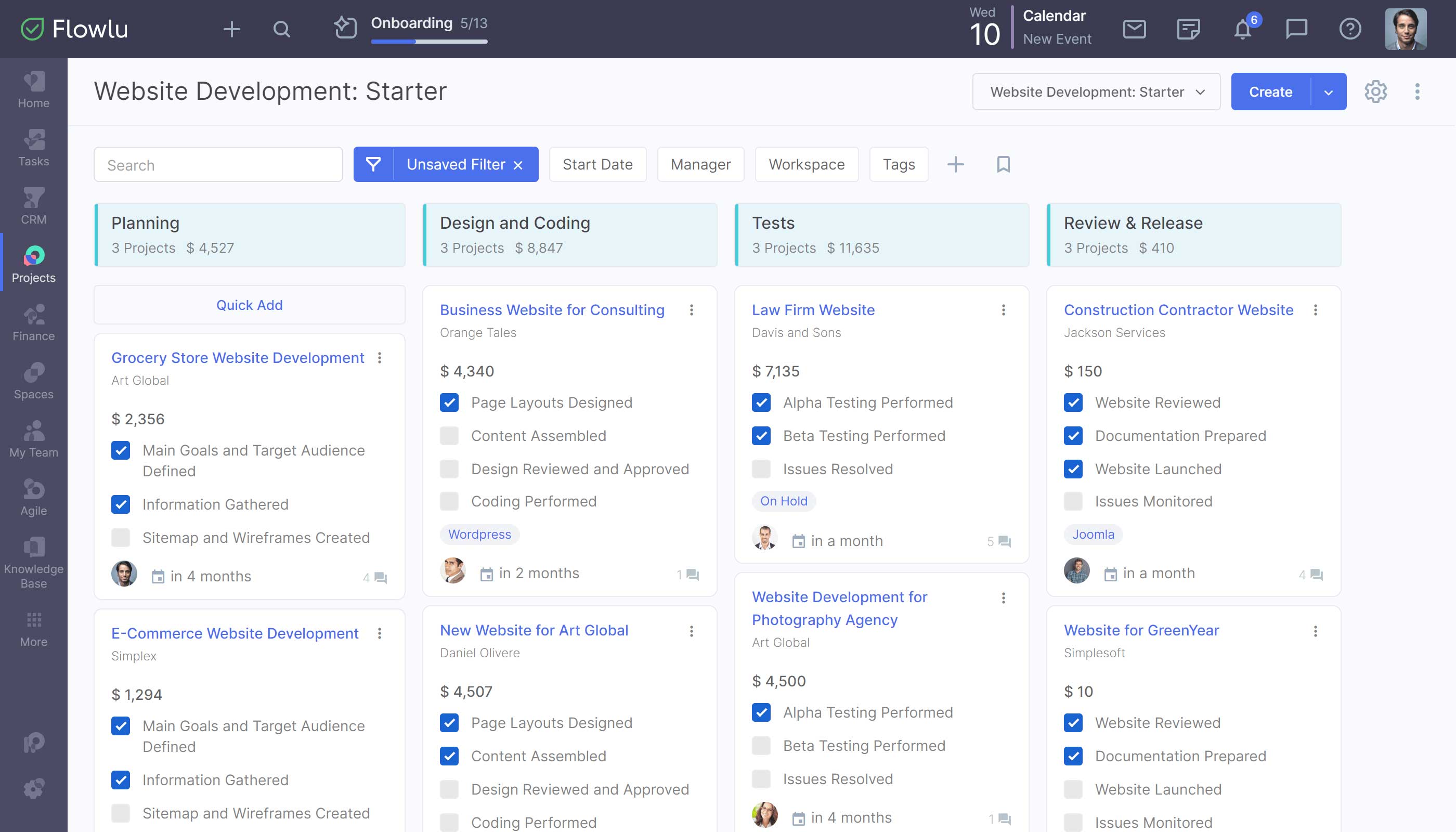
Flowlu packs a punch when it comes to features. Users highlight its powerful CRM and project management capabilities, often comparable to what you'd find in expensive enterprise tools. It's like having access to the big leagues without breaking the bank – a major win for small and medium businesses.
The Flowlu support team is known for being responsive, helpful, and friendly. Whether you're a tech whiz or not, they're there to answer your questions and troubleshoot any issues. Users appreciate this support crew that goes the extra mile, making you feel like you're not just another customer.
Flowlu isn't just a static platform; it's constantly evolving based on user feedback. Users love being part of a community that shapes the platform's future, knowing it will adapt and grow alongside their businesses.
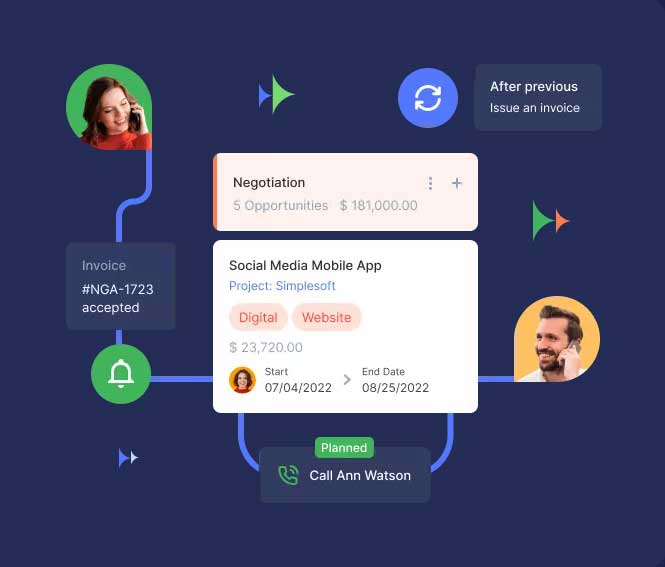
Top Complaints About Flowlu
Unlike some of its main competitors, such as Zoho, where users frequently mention issues like steep learning curves or slow loading times, Flowlu doesn't have a single, dominant complaint cropping up in reviews. The feedback for Flowlu tends to cover a broader spectrum of minor concerns that are spread out across various features and functionalities within the platform. This indicates that while Flowlu doesn't suffer from any major deal-breaking flaws, there are several smaller areas of the user experience that could benefit from refinements and improvements.
- Design Desires: Users yearn for a UI refresh, seeking a splash of color and increased customization options. While the current interface is praised for its functionality, some find it visually lacking and desire more personalized aesthetics.
- Storage Woes: Integrations with popular storage services like Dropbox are a recurring wish. Users want seamless file management without hopping between platforms.
- Memory Mishaps: Inconsistent view saving frustrates some users. Switching back and forth between preferred views like Kanban and list can be inconvenient if the platform doesn't retain the last-used option.
- Feature Frustrations: While Flowlu boasts a comprehensive suite, some gaps are felt. Users highlight missing website development, email marketing, client portal, and recurring payment functionalities. These absences can necessitate additional tools and disrupt workflow.
- Buggy Blues: Occasional reports of bugs and disappearing settings can be a pain point. Glitches like incomplete client payments and vanishing preferences are certainly not ideal.
- Renewal Red Flags: Beware of automatic renewal charges! Some users reported unexpected charges and difficulty obtaining refunds, even when not actively using the software. Scrutinize billing practices carefully to avoid surprises.
- Feature Envy: Comparisons to competitors like Zoho and Bitrix24 reveal desired functionalities. Client portals, contract signing, telephony integration, and multi-currency billing are among the features users believe would elevate Flowlu to the next level. While the roadmap suggests these might be addressed in the future, some find the wait frustrating.
- Missing Essentials: At the time of writing, certain core features like client portals and recurring payments are unavailable. This can be a dealbreaker for businesses relying on these functionalities.
- Limited Collaboration: The ability to assign only one user per task seems restrictive for some teams. More flexible assignment options could enhance collaborative project management.
Remember, these are just some user concerns; your experience may differ. Consider your specific needs and weigh these potential drawbacks against the platform's strengths before deciding.
Flowlu vs. The Competition
Flowlu offers project management capabilities akin to those found in platforms like Asana, Monday, or ClickUp, yet these features are not necessarily its main highlight. While it does include time tracking and invoicing functionalities, it doesn't specialize in these areas to the extent of tools like Clockify, Paymo, or TrackingTime. Instead, Flowlu positions itself more as an integrated business suite, similar to Zoho, Bitrix24, or Scoro, offering a broader range of business solutions.
Aesthetically, Flowlu might not match Zoho's polished interface, but it's worth noting that Scoro also doesn't lead in this aspect. Where Flowlu truly stands out is in its pricing strategy. It adopts a unique approach by offering packages for groups of 8 users/seats at a competitive rate, making it an exceptionally cost-effective option. This pricing model can be significantly more economical than Scoro's, and when compared to Zoho, which can become quite expensive as you add more business tools, Flowlu presents a more budget-friendly alternative. With Zoho, to manage costs, businesses often have to be selective about the tools they use, whereas Flowlu's model offers comprehensive capabilities at a lower overall cost.
However, it's important to note that when compared to Zoho One, Flowlu may not offer as extensive or varied a range of features. Therefore, it's wise for potential users to carefully compile a list of all the functionalities and tools they need before making a long-term commitment to Flowlu. This approach ensures that Flowlu's offerings align with your business's specific requirements and expectations, helping to avoid gaps in necessary features that could impact your operations down the line.
Price and Cost Comparison
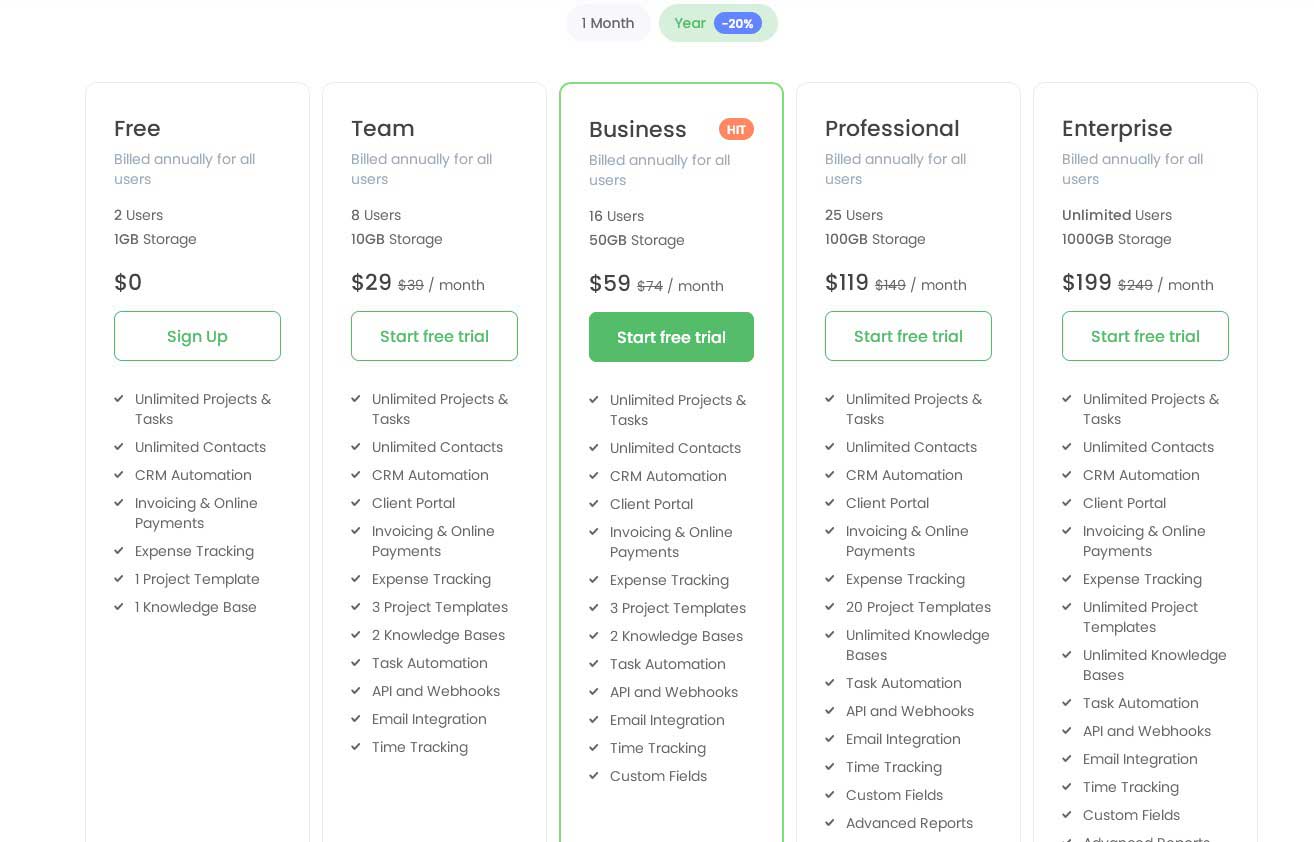
Pricing is undoubtedly Flowlu's standout feature, offering an exceptionally favorable structure for small businesses while remaining reasonable for larger organizations. The starting package is priced at $29 per month for 8 users, which is an impressive value, especially when compared to standard per-user pricing models prevalent in the industry. This makes Flowlu competitive with some of the most affordable options, such as Freedcamp, TimeCamp, and Paymo, catering to more niche project management needs.
As you move up Flowlu's pricing tiers, the leap in features is relatively modest, with the next tier available at $59 USD for 16 users. Even the unlimited user package comes at a fair price, making Flowlu accessible to many businesses. However, it's important to consider that the main limitation of Flowlu might be its storage capacity. This could be a significant drawback for businesses that deal with large files, such as video editing or design firms working with uncompressed files. In such cases, it might be necessary to complement Flowlu with an external storage solution like Dropbox, which could affect the overall cost-effectiveness of the platform.
The pricing comparison between Flowlu and Zoho One highlights a significant advantage for Flowlu, especially regarding cost efficiency for small to medium-sized teams. Zoho One's pricing model starts at $37 per employee per month, which can quickly add up for a team. For example, a company with 8 users would find themselves paying more for just one employee on Zoho One than for the entire team on Flowlu.
When compared to Bitrix24, which charges $49 per month for a package of 5 users, Flowlu still emerges as a more cost-effective choice, offering a package for 8 users at a lower price point. Although the price difference between Flowlu and Bitrix24 isn't as dramatic, Flowlu still provides better value, especially when considering the number of users included. However, similar to Bitrix24, Flowlu users also need to be mindful of storage limitations, which could be a constraint for businesses with extensive data storage needs.
The primary consideration with Flowlu's pricing model arises for very small teams or startups in their initial stages, where the team size might be 2-3 users. In such cases, the necessity to opt for an 8-user package might seem less efficient. Nonetheless, even for these smaller teams, Flowlu's pricing per user remains more economical than a single-user subscription on Zoho One, making it an attractive option for businesses focused on growth and scalability.
Flowlu’s Privacy & Security
Overall, Flowlu's privacy policy is more user-friendly and transparent than many other standard privacy policies.
- They state that they do not sell your data to third parties. This is a departure from the standard practice of many companies, which often collect and sell user data to third-party advertisers or marketing firms.
- They claim that no one at their company reads your personal information. This is a bold statement, and it is difficult to verify whether or not it is true. However, it does suggest that Flowlu takes the privacy of its users very seriously.
- They say they will delete all your data if you close your account. This is a good policy, allowing users to completely remove their information from Flowlu's systems.
Flowlu and GDPR: Key Points:
Flowlu, provided by Cloud Solutions Global FZCO, emphasizes its commitment to GDPR compliance and outlines key practices:
Compliance:
- Flowlu is GDPR compliant and requires its customers to adhere to GDPR principles as well.
- They updated their Data Processing Agreements (DPAs) and Privacy Policy to reflect GDPR requirements.
- A dedicated Data Protection Officer oversees compliance.
Data Handling:
- Flowlu collects personal data like company name, email, usage data, and cookies.
- Data is encrypted and pseudonymized wherever possible.
- Daily backups ensure data availability in case of incidents.
- Customer data is not outsourced except to the approved customer support team.
User Rights:
- Flowlu respects user rights to information, access, rectification, erasure, restriction, portability, and objection.
- Secure methods like APIs facilitate data portability.
Transparency:
- Flowlu provides clear information about data processing and user rights.
- This page will be updated to reflect any changes in GDPR regulations.
Additional Notes:
- Flowlu doesn't specify the location of its servers where data is stored.
- Users should review Flowlu's DPA and Privacy Policy for complete details.
Remember: While Flowlu claims GDPR compliance, it's crucial to do your own research and understand their practices before trusting them with your data.
Flowlu's History & Update Frequency
It's somewhat unusual that Flowlu doesn't feature an "About Us" page where potential users and interested parties can learn about the team and the company's history, a common element found on the websites of its competitors. Despite this, Flowlu's mailing address is listed in Dubai, indicating their physical presence there. The website's activity traces back to 2018, positioning Flowlu as one of the newer entrants in the field.
However, Flowlu distinguishes itself with a transparent and dynamic public roadmap. This roadmap offers a clear view of the latest features that have been rolled out, ongoing developments, and what's planned for the future. An engaging aspect of this roadmap is the ability for users to participate by voting on features they believe should be given priority. This level of openness and user engagement in product development is quite commendable.
Among the most recent updates, users have seen integrations with popular tools like Trello, enhancements in task management, invoicing, and mobile app functionalities. Currently in the works are further integrations with widely used communication platforms such as WhatsApp and Facebook Messenger. Looking ahead, Flowlu plans to introduce significant upgrades to its time-tracking capabilities, task and project management features, and a broader range of integrations, indicating a strong commitment to evolving and improving the platform in response to user feedback and industry trends.
The Final Verdict on Flowlu
Flowlu offers a streamlined business solution at an attractive price point. However, missing features, limited customization, and storage concerns might warrant exploring alternatives for specific needs. Carefully evaluate your requirements and priorities before diving in.
Written by Remus Zoica
